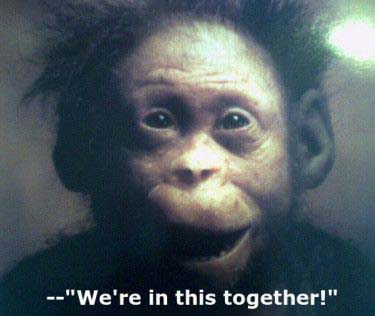How to Overcome Anxiety by Understanding Your Psyche, 2

In my first post on how to overcome anxiety, we saw its instinctual and archetypal roots; in this post, I reflect more on how to make practical use of that kind of awareness.

Australopithecus afarensis
How can the realization that anxiety often is rooted in instinct and archetype actually help us? Well to start with…
Stop Beating Yourself Up!
Really! Too often, people dealing with anxiety conditions engage in vicious self attack, accusing themselves of being weak, morally flawed, ” drama queens”, or even, narcissistic.
Actually, they’re none of these things. The truth is that they’re dealing with a psychic and genetic heritage containing incredible inherited wisdom, but which sometimes gets out of sync with our current world.
Our Primate Inheritance
The young lad pictured above is an Australopithecus, an early human species flourishing between 2.9 and 3.9 million years ago. His grassland savannah world was very different from ours. So, sometimes, psychological mechanisms that we’ve inherited from our early ancestors just won’t fit with conditions in the modern world. It would be a huge mistake to morally condemn ourselves for that! We’ve inherited much ancient wisdom, but sometimes in counselling & case studies we face situations where instinctual or archetypal wires get crossed.
[hs_form id=”17″]
Good Instinct on the Wrong Track
Consider phobias, for instance. Arachnophobia (fear of spiders) was appropriate in the environment early humans inhabited, where poisonous creatures were a common danger. It’s less useful in, say, suburban Toronto, but if it gets activated, it can cripple a person’s life. Similarly, xenophobia, fear of strangers, made sense when people from “the other side of the hill” spelled danger, but it’s very unhelpful for modern people, say, on the subway.
Likewise, embarrassment, shame and guilt are necessary in a social species like ours to ensure group harmony and social cohesion. Yet when over-blown, these responses can lead to avoidant personality disorder, where a person feels constantly and inappropriately ashamed, inadequate and hypersensitive to what others think.
Again, the instinctual desire for connection and attachment to others is absolutely essential for the survival of a small primate group in a hostile environment. Yet, it can get distorted into debilitating separation anxiety and anxious attachment, where an individual suffers intense distress at the imagined threat of the loss of a loved one, or even at being out of sight of a loved one.

“Lucy”
Living with the Two Million Year Old Person
How can we know and appreciate our instinctual and archetypal heritage, yet live with it in a way that keeps anxiety as a useful servant, rather than a debilitating master? Good /a-midlife-transition can show us how to overcome anxiety, by living in accord with who we fundamentally are, and with our instinctual and archetypal roots.
[cta]
